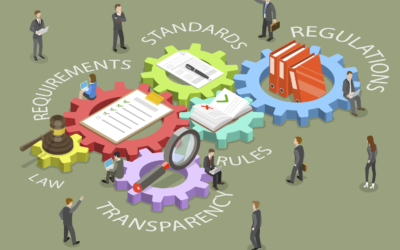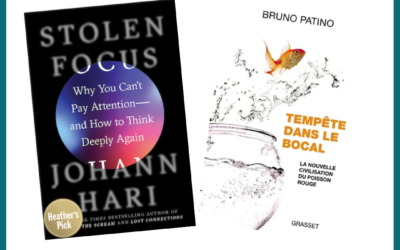As the US, Europe and Australia increase their legislative & judicial pressure on Big Tech, why are investment managers, especially impact investing professionals, not being clear about the governance risk and divesting from Big Tech ?

ESG or Impact investing is all the rage these days, all over the world. Oil companies, deemed a climate risk, are removed from all portfolios but those of out of touch institutions like university or foundation funds.
Meanwhile, portfolio managers and CFP’s ( Certified Financial PLanners) keep including “Big Tech” as stars in their Impact-focused stock picks.
Doesn’t ESG include the word “ Governance? ” Are these managers blinded by the light of short term profit without seeing the long term risk of regulation, judicial action and break up for investors?
One wake up call came up in 2018 when Jana Partners, a New York based activist fund, and the California State Teachers’ Retirement System (CalSTRS), called out Apple for not adding features to make their devices less addictive to kids and teens. This signals the coming together of activism and impact investing in North America. Apple complied, at a minimal level.
This was just the beginning of a trend from lawmakers everywhere asking Big Tech to be good corporate citizens, and better yet, stop attacking our mental health and democracies with disinformation and hidden micro ad campaigns.
Regulatory & Judicial Action in the US since 2019:
US House Investigation into Apple, Amazon, Facebook and Google
In early 2019, US representatives in the House started investigating Big Tech ( Apple, Amazon, Facebook and Google) in a rare bipartisan effort, by holding hearings of their leaders on the basis that their accumulated excessive market power was against US competition laws — even if those needed some updating.
The outcome, in October 2020, is one “blockbuster”, 400 plus page report, as The Verge reports incriminating the Big Four. Its 449-page report criticizes these companies for buying competitors, preferencing their own services, and holding outsized power over smaller businesses that use their platforms. “Our investigation revealed an alarming pattern of business practices that degrade competition and stifle innovation,” said committee member Val Demings (D-FL).
What’s disappointing so far is while the problems are recognized on both sides, Republicans and Democrats disagree on the cures to the ails Big Tech has created. The Republicans’ chief objections to the report are that some of the legislative proposals against the tech giants could hamper other businesses and impede economic growth, said four people with knowledge of the situation.
Several Republicans were also frustrated that the report didn’t address claims of anti-conservative bias from the tech platforms. Rep. Ken Buck (R., Colorado) said in “The Third Way” that some of the recommendations were “a nonstarter for conservatives.”
Justice Department Antitrust Complaint Against Google
The report was expected to kick off other actions against the tech giants. The Justice Department has been working to file an antitrust complaint against Google, followed by separate suits against the internet search giant from state attorneys general.
In presentations to state attorney generals at the end of September 2020, the Justice Department outlined its legal case centered on how Google uses its dominant search engine to harm rivals and consumers. Meeting with the state attorneys general was to be of the final steps before the department files its suit against the company.

US Senate Commerce Committee inquiry into Google, Facebook, and Twitter
Meanwhile, on October 1st 2020, the US Senate Commerce Committee has voted to subpoena the heads of Google, Facebook, and Twitter. One focus will be the legal protections they enjoy regarding what they leave up and take down on their platforms.
They are also likely to be challenged over controversies about privacy and misinformation. However, each side is likely to have different priorities — with some Republican members speaking about the alleged censorship of conservative views online, while Democrats focus on competition and misinformation.
Regulatory & Judicial Action in Europe:
The European GDPR said no to hidden trackers ( aka “cookies”)
The European Union implemented the GDPR ( General Data Protection Regulation) in May 2018, which sanctions not obtaining consent for the tracking of users on web sites. It opened a window into giving user back control over their data that is still being improved on but was emulated in Brazil, California and Australia, with Canada talking about a similar law.
While it is true that Facebook, Google, and WhatsApp have received GDPR fines, their number and size disappointed GDPR advocates. The French data protection agency fined Google a record €50 million, but this amount is a rounding error compared to its overall budget.
For the largest tech companies to truly take data protection seriously, the fines will need to be much higher. Margarethe Vestager, head of the European Commission, has called for stronger enforcement of the GDPR and policies that promote competition in the tech industry.
The European Digital Services Act seeks to make Big Tech share its Data Trove
The European Union’s draft version of a forthcoming law reportedly bans tech giants from giving their own products preferential treatment.
The new Digital Services Act package should modernise the current legal framework for digital services by means of two main pillars:
First, the Commission proposes clear rules framing the responsibilities of digital services to address the risks faced by their users and to protect their rights. The legal obligations would ensure a modern system of cooperation for the supervision of platforms and guarantee effective enforcement.
Second, the Digital Services Act package should contain ex ante rules covering large online platforms acting as gatekeepers, which now set the rules of the game for their users and their competitors. The initiative should ensure that those platforms behave fairly and can be challenged by new entrants and existing competitors, so that consumers have the widest choice and the Single Market remains competitive and open to innovations.
The draft of the Digital Services Act, seen by a number of news outlets, says that big tech “gatekeepers” may have to share user data with rivals to create an even playing field in some circumstances.
UK Probe into Facebook from 2017 to Feb. 2019 calls for regulation
Facebook deliberately broke privacy and competition law and should urgently be subject to statutory regulation, according to a devastating parliamentary report denouncing the company and its executives as “digital gangsters”.
The final report of the Digital, Culture, Media and Sport select committee’s 18-month investigation into disinformation and fake news accused Facebook of purposefully obstructing its inquiry and failing to tackle attempts by Russia to manipulate elections.
“Democracy is at risk from the malicious and relentless targeting of citizens with disinformation and personalised ‘dark adverts’ from unidentifiable sources, delivered through the major social media platforms we use every day,” warned the committee’s chairman, Damian Collins.
China Google Probe into Android OS
And in China, Reuters news agency reports that the country is preparing its own competition probe into Google over the Android phone operating system.






